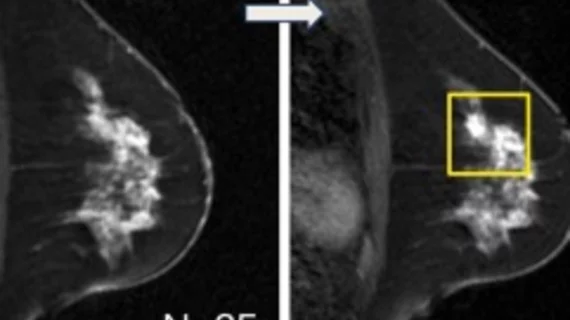AI model spots up to 30% of breast cancers missed on MRI
Artificial intelligence-based re-evaluation of breast MRI exams could increase detection of early-stage cancers.
The authors of a new paper in Academic Radiology estimate that a second look AI algorithm they developed could improve the identification of these cancers by as much as 30%. Re-evaluation by the algorithm could be beneficial for spotting signs of cancer radiologists overlook, potentially resulting in earlier treatment, authors of the new paper suggest.
“Retrospective studies suggest that 34–47% of detected cancers were present already in prior MRI exams. More recent studies report visual correlates in the preceding year in up to 75% of screen-detected cancers,” corresponding author Lucas C. Parra, with City College of New York, and colleagues noted. “While these studies benefit from the hindsight of retrospective review, they suggest an opportunity for earlier lesion detection, even though radiologists already demonstrate excellent sensitivity with MRI.”
For the study, the team fine-tuned a convolutional neural network AI model that had already been pre-trained on breast MRI data. Researchers further trained the model using an additional 3,029 breast MRIs, 115 of which contained cancers that were diagnosed within one year of the negative exam.
Researchers set a goal of being able to identify cancers initially missed by radiologists up to one year earlier. It did so with an area under the ROC curve of 0.72, with a radiologist determining that the AI could have identified up to 30% more of the highest risk cancers that were eventually detected one year after a negative exam. For over half of the cases, the model also provided accurate information on the anatomic region where the cancers would eventually be detected.
If validated, the tool could result in greater detection without significantly increasing radiologists' workloads. What's more, it could trigger earlier treatment in women who would go on to develop high risk cancers.
“For breast cancer, early detection is crucial for improving treatment outcomes, making even small increases impactful. However, re-evaluating MRIs takes effort. Therefore, the benefit of early detection (added sensitivity) must be balanced against the effort of re-evaluation rate,” the authors noted.
The group signaled that this approach will continue to gain momentum in terms of clinical utility as datasets grow larger and more diverse.
Learn more about the study here.

